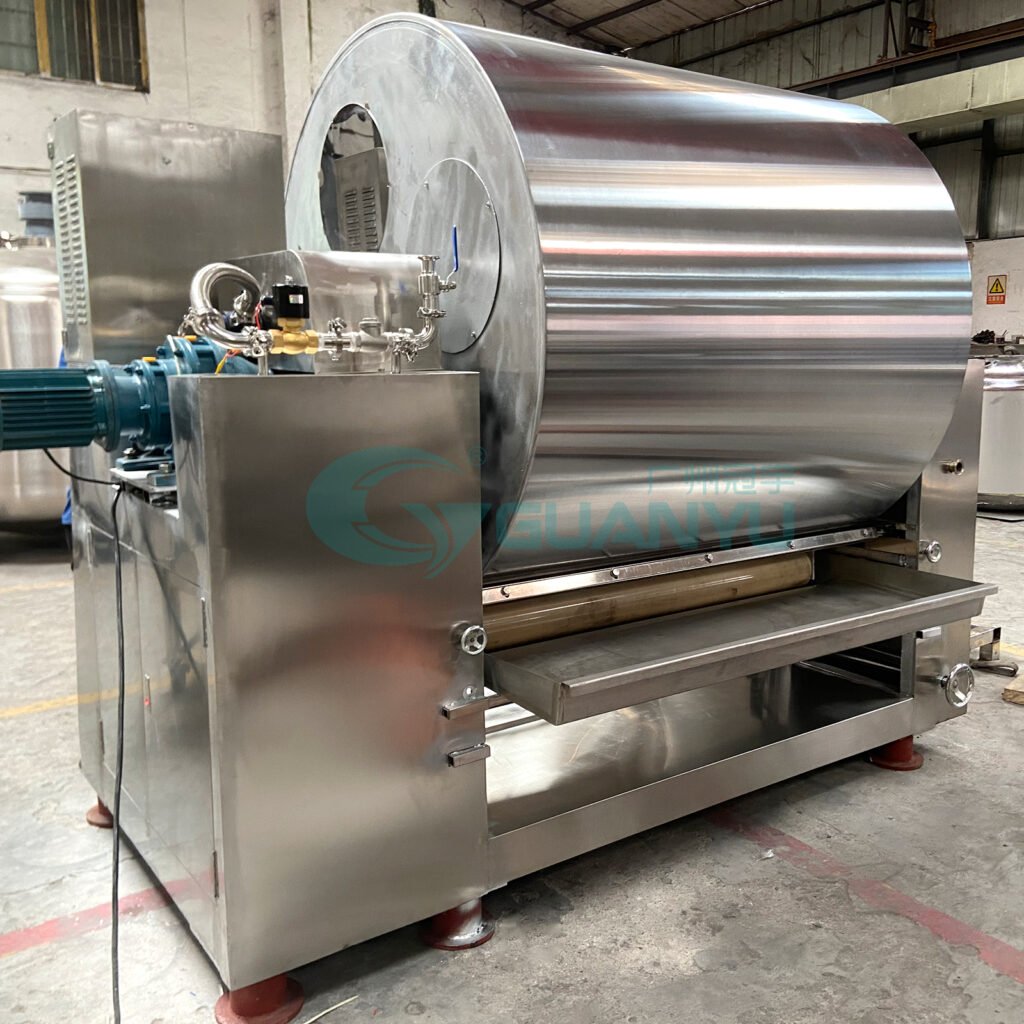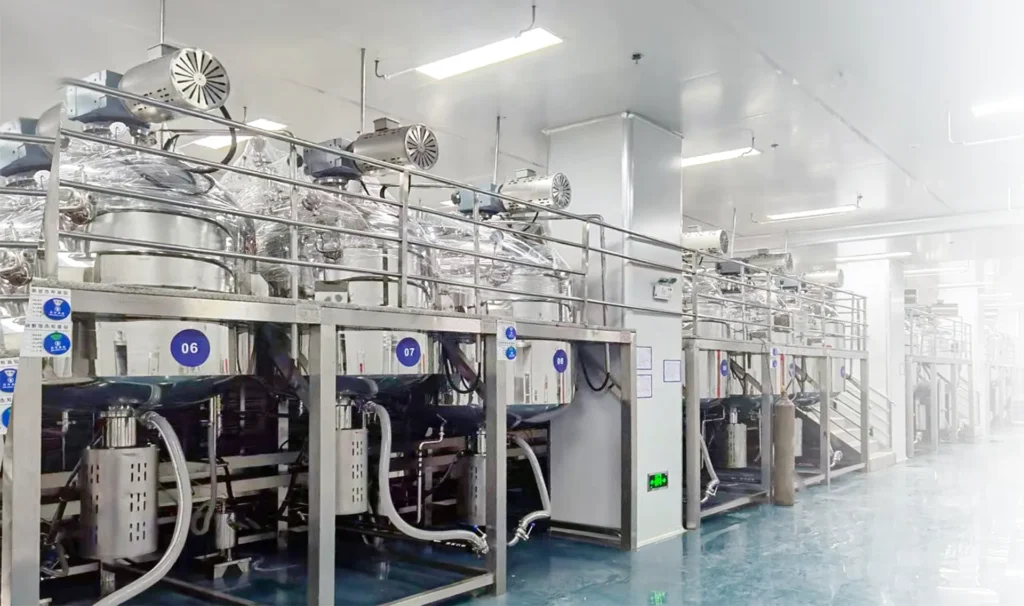In verschiedenen Herstellungsprozessen, Industriemixer sind zum Mischen unerlässlich, Emulgierung, Homogenisierung, oder Stoffe miteinander vermischen. Diese Maschinen steigern den Wert der Endprodukte in zahlreichen Branchen erheblich. Dieser Artikel befasst sich mit dem Konzept industrieller Mischer, ihre Typen, und ihre vielfältigen Einsatzmöglichkeiten.

Was ist ein Industriemischer??
Ein Industriemischer ist eine Maschine, mit der verschiedene Stoffe für die Produktion kombiniert werden, Herstellung, und andere industrielle Anwendungen. Diese Mischer gewährleisten die vollständige Vermischung aller Flüssigkeiten und Materialien zu einem fertigen Produkt. Beim industriellen Mischen werden hauptsächlich zwei Methoden verwendet: Chargenmischen und kontinuierliches Mischen. Beim Chargenmischen wird eine feste Menge an Materialien über einen festgelegten Zeitraum gemischt, Beim kontinuierlichen Mischen werden kontinuierlich Materialien hinzugefügt, während die Mischung durch Rühren dicker wird. Industriemischer sind in Branchen wie der Chemie von entscheidender Bedeutung, Bergbau, Konstruktion, Öl und Gas, sowie Zellstoff und Papier.

Arten von Industriemischern
Agitator -Mixer
Rührwerke vermischen Feststoffe, Gase, und Flüssigkeiten, einschließlich Schlämmen und Suspensionen. Sie verwenden ein rotierendes Laufrad, um die Medien zu mischen. Die meisten Rührwerke sind Top-Einstiegsgeräte, Bietet Vielseitigkeit bei der Handhabung verschiedener Viskositäten. Andere Typen umfassen einen seitlichen Einstieg, unterer Eingang, und Rührwerke mit Magnetantrieb.
Statische Mischer
Auch als Inline-Mischer bekannt, Statische Mischer haben bandförmige Klingen in einem Zylinder, die Materialien ohne bewegliche Teile mischen. Sie sind ideal für Flüssigkeiten mit niedriger Viskosität und werden in Branchen wie der Chemie eingesetzt, Kosmetik, Automobil, pharmazeutisch, und Wasseraufbereitung.
Trommelmixer
Trommelmischer rotieren, um Chemikalien oder Materialien mithilfe interner Messer zu mischen. Diese Mixer sind tragbar, einen dichten Verschluss haben, und hinterlassen einen kleineren Fußabdruck, Daher werden sie bevorzugt zum Mischen von Materialien mit niedriger bis mittlerer Viskosität wie Zement verwendet, Schlämme, und Klebstoffe.
Hochschermischer
Hochschermischer arbeiten mit hohen Geschwindigkeiten und leistungsstarken Klingen zur Emulgierung, Homogenisierung, Dispersion, und Partikelgrößenreduzierung. Sie sind effizient, verbrauchen aber mehr Strom als Standardmixer.
Paddelmixer
Paddelmixer verwenden zum Mixen große Paddel, mischen, und Konditionierungsstoffe wie Schlämme und Schlämme. Sie werden häufig zum Trockenmischen verwendet, eignen sich aber auch zum Mischen von Flüssigkeiten und Feststoffen.
Bandmischer
Bandmischer sind statisch und dünn, flache Klingen, die als Hindernisse für die Vermischung von Materialien dienen. Sie eignen sich effizient für die Handhabung einer Vielzahl von Pulvern und Schüttgütern.

Beliebte Anwendungen von Industriemischern
Konstruktion
Betontrommelmischer sind im Baugewerbe für die Herstellung von Beton für Fundamente von entscheidender Bedeutung, Brücken, Flughäfen, Platten, Dämme, Eisenbahnen, und Wände. Sie sorgen für eine präzise Vermischung der Rohstoffe, um die gewünschte Konsistenz zu erreichen.
Chemische Industrie
Industriemischer werden in der chemischen Produktion häufig für Anwendungen wie die chemische Zusammensetzung eingesetzt, Feststoffsuspension, pH-Kontrolle, Additivmischung, Abwasserbehandlung, und Gasverteilung.
Bergbau & Mineralverarbeitung
Im Bergbau, Mischer sind für Prozesse wie die Goldlaugung unerlässlich, Zerstörung durch Zyanid, Lösungsmittelextraktion, und Güllelagerung. Sie sorgen für eine sichere und effiziente Verarbeitung von Materialien.
Farben & Harze
Mischer sind bei der Herstellung von Farben und Harzen von entscheidender Bedeutung, Gewährleistung der richtigen Pigmentmischung und Erzielung der richtigen Farbe und Konsistenz. Sie mischen auch Zusatzstoffe bei, um die Haltbarkeit zu verbessern.
Zellstoff & Papier
Mischer in der Zellstoff- und Papierindustrie zersetzen Zellulosefasern und entfernen Lignin, Schaffung einer homogenen Mischung, die für die Herstellung hochwertiger Papierprodukte unerlässlich ist.
Öl & Gas
In der Öl- und Gasindustrie, Mischer werden in Bohrspülungen eingesetzt, Mischen von Rohöltanks, Asphaltmischung, und Herstellung von Kraftstoffadditiven, spielen sowohl in der frühen als auch in der späten Produktionsphase eine entscheidende Rolle.
Abschluss
Industriemischer sind in verschiedenen Branchen unverzichtbar, Verbesserung der Produktqualität und -effizienz. Das Verständnis ihrer Typen und Anwendungen hilft bei der Auswahl des richtigen Mischers für spezifische industrielle Anforderungen.
Danke, dass du endlich darüber gesprochen hast > Allgemeine Informationen zu Industriemischern: Typen und Anwendungen – Maschinenlieferant
für kundenspezifische Produktion — Guangzhou
Guanyue < Hat mir gefallen!
Toller Artikel.
Vielen Dank für die gute Beschreibung. Es handelte sich tatsächlich um einen Vergnügungsbericht.
Sehen Sie von Ihnen weitaus angenehmer aus!
Übrigens, Wie können wir kommunizieren??
Toller Artikel, genau das, was ich brauchte.
Haben Sie ein Spam-Problem auf dieser Website?; Ich bin auch ein
Blogger, und ich wollte Ihre Situation wissen; Wir haben einige schöne Praktiken erstellt und
Wir suchen den Austausch von Strategien mit anderen Leuten, Schicken Sie mir bei Interesse einfach eine E-Mail.
Ich muss Ihnen für diese sehr gute Lektüre danken!!
Ich habe auf jeden Fall jedes bisschen davon genossen. Ich habe Sie als Favorit zum Anschauen gespeichert
bei neuen Dingen, die du postest…
Hallo, ich bin so begeistert, dass ich deinen Weblog gefunden habe, Ich habe dich wirklich durch einen Fehler gefunden,
während ich bei Digg nach etwas anderem suchte, Wie dem auch sei, ich bin jetzt hier und möchte mich ganz herzlich dafür bedanken
ein fantastischer Beitrag und ein rundum spannender Blog (Ich liebe auch das Thema/Design), Ich habe keine Zeit zu gehen
Ich habe alles im Moment durchgelesen, aber ich habe es gespeichert
und auch Ihre RSS-Feeds eingebunden, Wenn ich also Zeit habe, werde ich zurückkommen
mehr lesen, Bitte machen Sie weiter so, b.
Hallo, Natürlich ist dieser Absatz wirklich gut und ich habe daraus viel zu diesem Thema gelernt
des Bloggens. Danke.
Hallo. Ich habe Ihren Blog über MSN gefunden. Das ist ein wirklich gut geschriebener Artikel.
Ich werde es auf jeden Fall mit einem Lesezeichen versehen und zurückkommen, um weitere nützliche Informationen zu lesen.
Danke für den Beitrag. Ich werde auf jeden Fall wiederkommen.
Heute, Ich ging mit meinen Kindern zum Strand. Ich habe ein Meer gefunden
Schale und gab es meiner 4 jährige Tochter und sagte “Sie können das Meer hören, wenn Sie es an Ihr Ohr halten.” Sie legte die Muschel darauf
ihr Ohr und schrie. Darin befand sich ein Einsiedlerkrebs, der zwickte
ihr Ohr. Sie will nie mehr zurück! LoL, ich weiß, das ist absolut so
Off-Topic, aber ich musste es jemandem erzählen!
Eine Person hilft im Wesentlichen dabei, ernsthafte Beiträge zu verfassen, würde ich sagen.
Das war das allererste Mal, dass ich Ihre Website besucht habe, und zwar bisher?
Ich war überrascht von der Analyse, die Sie durchgeführt haben, um diesen speziellen Beitrag großartig zu machen.
Großartige Aktivität!
Ich musste mich bei Ihnen für diese gute Lektüre bedanken!! Ich habe wirklich jedes bisschen genossen
davon. Ich habe Ihr Buch markiert, damit Sie sich neue Dinge ansehen können, die Sie veröffentlichen …
Was ist los? Ich bin neu in diesem Bereich, Ich bin darüber gestolpert, was ich entdeckt habe
Es ist wirklich nützlich und hat mir sehr geholfen.
Ich hoffe, einen Beitrag leisten zu können & Helfen Sie verschiedenen Kunden, so wie es mir geholfen hat.
Tolle Arbeit.
Ich bin zusammen mit Ihren Schreibfähigkeiten äußerst inspiriert
genauso intelligent wie mit der Formatierung Ihres Blogs.
Ist, dass dies ein bezahltes Thema oder haben Sie es selbst angepasst?
So oder so bleiben Sie das hervorragende hochwertige Schreiben auf, Es ist ungewöhnlich, einen so tollen Blog wie diesen zu lesen
heutzutage..
Wenn jemand nach seinem nötigen Ding sucht, deshalb er/sie
möchte das im Detail zur Verfügung stellen, Daher wird das Ding hier beibehalten.
Dieser Artikel ist in der Tat anspruchsvoll und hilft neuen Besuchern, die es wünschen
zum Bloggen.
Was ist los, Nachdem ich diesen bemerkenswerten Artikel gelesen habe, bin ich es
Ich freue mich auch, mein Wissen hier mit Freunden zu teilen.
Sehr energiegeladener Beitrag, Ich habe diesen Teil genossen. Wird es einen Teil geben? 2?
Hervorragender Überblick
Gut strukturiert
Solide Analyse
Aufschlussreiches Stück
Wirklich gut geschrieben
Liebte dieses Stück
Schön artikuliert
Schätzen Sie die Einsicht
Klare Erklärung
Sehr gut präsentiert
Aufschlussreiches Stück
Danke fürs Teilen
Hochwertiger Inhalt
Schön artikuliert
777Das Design von szcomlog ist ziemlich schick! Die Navigation ist einfach, und die Informationen sind gut aufbereitet. Könnte jedoch einige aktuellere Beiträge gebrauchen. Aber trotzdem, 777schcomlog bekommt von mir einen Daumen hoch!
Was für eine Information über die Eindeutigkeit und Bewahrung wertvoller Erfahrungen in Bezug auf unvorhergesehene Emotionen.
Es ist wirklich eine nette und hilfreiche Information. I am happy that you simply shared this helpful information with
uns. Bitte halten Sie uns so auf dem Laufenden. Vielen Dank für das Teilen.
When someone writes an paragraph he/she retains the
plan of a user in his/her mind that how a user can understand it.
So that’s why this paragraph is perfect. Danke!
Ausgezeichneter Beitrag. I was checking continuously this blog and I am impressed!
Extremely helpful info specially the last part 🙂 I care for such info much.
I was looking for this particular information for
a very long time. Thank you and best of luck.
I take pleasure in, result in I discovered just what I used to be having a look for.
You’ve ended my 4 day long hunt! God Bless you man. Have a great day.
Bye
This article offers clear idea in favor of the new viewers of blogging,
So funktioniert Bloggen wirklich.
Guter Beitrag. Ich gehe einige davon durch
auch Probleme..
Vielen Dank, dass Sie endlich darüber geschrieben haben > allgemeine Informationen
über Industriemischer: Typen und Anwendungen – Maschinenlieferant für
Anpassung — Guangzhou Guanyu < Liebte es!
Ihr Artikel hat mir sehr geholfen, Gibt es weitere verwandte Inhalte?? Danke! https://www.binance.com/fr-AF/register?ref=JHQQKNKN
Ich glaube nicht, dass der Titel Ihres Artikels mit dem Inhalt übereinstimmt, lol. Nur ein Scherz, Hauptsächlich, weil ich nach dem Lesen des Artikels einige Zweifel hatte.
Es ist schwierig, erfahrene Leute zu diesem Thema zu finden, aber du scheinst zu wissen, wovon du redest!
Danke
Wir sind eine Gruppe von Freiwilligen und starten ein neues Programm in unserer Gemeinde.
Ihre Website bot uns wertvolle Informationen, an denen wir arbeiten können. Sie haben hervorragende Arbeit geleistet und unsere gesamte Community wird Ihnen dankbar sein.
Es ist nicht das erste Mal, dass ich diese Website besuche, Ich stöbere täglich auf dieser Webseite und sammle täglich anspruchsvolle Daten von hier.
Eindrucksvoll! Es ist wirklich ein bemerkenswerter Text, Ich habe aus diesem Beitrag eine klare Vorstellung davon gewonnen.
Vielen Dank für Ihr Teilen. Ich mache mir Sorgen, dass mir kreative Ideen fehlen. Es ist Ihr Artikel, der mich voller Hoffnung macht. Danke. Aber, Ich habe eine Frage, Kannst du mir helfen?? https://www.binance.info/register?ref=IXBIAFVY
Können Sie uns mehr darüber erzählen?? Ich würde gerne mehr Details erfahren.
Schöner Beitrag. Auf Blogs, über die ich jeden Tag stolpere, lerne ich etwas Neues und Herausforderndes.
Es wird immer nützlich sein, Artikel anderer Autoren zu lesen und ein wenig von deren Websites zu üben.
Vielen Dank für einen weiteren fantastischen Artikel. Der Ort könnte anders sein
Jeder bekommt diese Art von Informationen in einer so idealen Schreibweise?
Ich habe nächste Woche eine Präsentation, und ich bin auf der Suche nach solchen Informationen.
Ich konnte mir einen Kommentar nicht verkneifen. Perfectly written!
Truly no matter if someone doesn’t know after that its up to other users that they will help, so here it
takes place.
Please let me know if you’re looking for a article author for your blog.
You have some really good articles and I think I
would be a good asset. If you ever want to take some of the load off, I’d absolutely love to write some content
for your blog in exchange for a link back to mine.
Please blast me an email if interested. Vielen Dank!
Nice blog! Is your theme custom made or did you download
it from somewhere? Ein Theme wie Ihres würde mit ein paar einfachen Anpassungen meinen Blog wirklich zum Strahlen bringen.
Bitte teilen Sie mir mit, woher Sie Ihr Design haben. Danke
Hallo Freunde, pleasant article and nice urging
commented here, I am in fact enjoying by these.
It’s amazing in favor of me to have a web site, which is valuable in support of my experience.
thanks admin